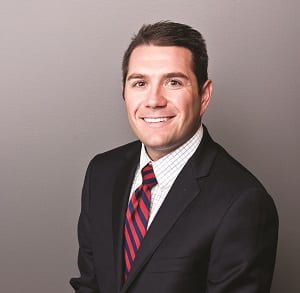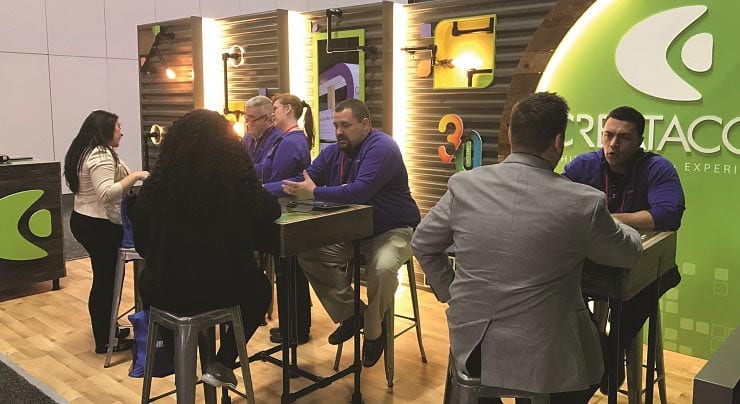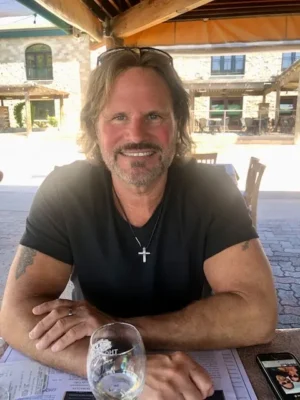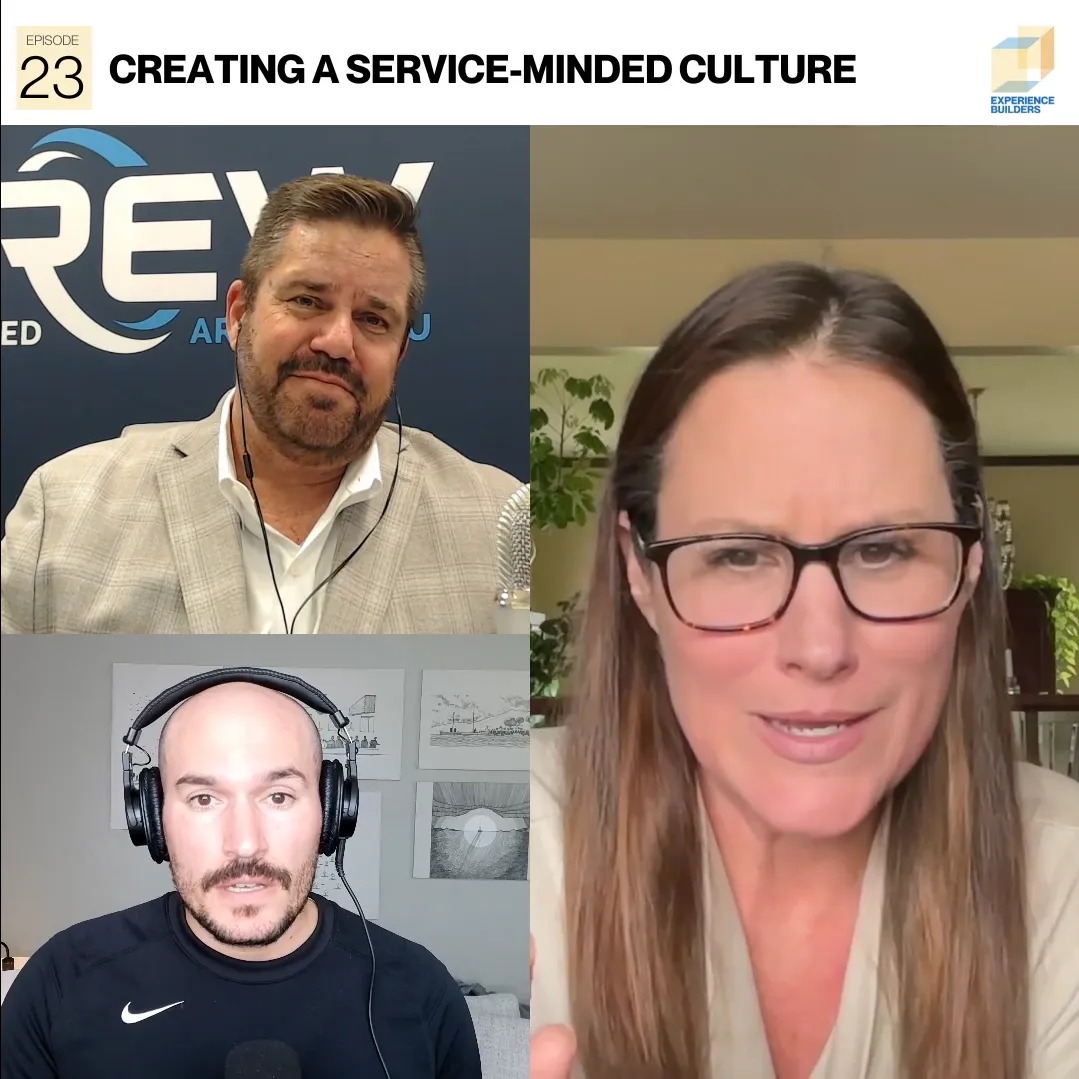by Cynthya Porter
The exhibition and event universe is a complex machine with an endless number of moving parts, all trying to advance clients, whether organizers or exhibitors or attendees, down a conveyor and through a perfect event. But at the core of the entire industry before a single ribbon is cut or badge is scanned are the promise makers–people who are on the front lines selling the space and the goods that give an exhibition life.
Whether selling venue space, general services or exhibit design, each has an integral role in the process of creating event nirvana. But even though their hats are all different, a sampling of professionals from each of those selling angles found that their philosophies, and in some ways their personalities, bear striking similarity.
 Unlike many who find themselves working in an exhibition and event field through roundabout means, Shannon Licygiewicz (pictured left), director of sales for the Albany Capital Center (ACC) in Albany, New York, more or less had her sights set on it since the time she was a young girl planning birthday parties for her friends and family. “I always had a flair for management, and in my brain at the time, I wondered if I could do it for a career,” Licygiewicz says. Her quest was answered by the Southern New Hampshire University hospitality degree program, where Licygiewicz found like-minded souls and a bevy of professors who all had time in the trenches handling various aspects of actual events.
Unlike many who find themselves working in an exhibition and event field through roundabout means, Shannon Licygiewicz (pictured left), director of sales for the Albany Capital Center (ACC) in Albany, New York, more or less had her sights set on it since the time she was a young girl planning birthday parties for her friends and family. “I always had a flair for management, and in my brain at the time, I wondered if I could do it for a career,” Licygiewicz says. Her quest was answered by the Southern New Hampshire University hospitality degree program, where Licygiewicz found like-minded souls and a bevy of professors who all had time in the trenches handling various aspects of actual events.
With a newly minted degree in convention and event management and a minor in food and beverage, Licygiewicz landed squarely in her profession–snapping up a job at the Rhode Island Convention Center as an event manager as many of her classmates foraged for positions at various stations in the industry, many of them not directly tied to their degrees. It turns out, Licygiewicz says, that the management and planning side of hospitality is harder to break into than many realized. “I’m definitely one of the lucky ones who was able to start right away,” she says.
 Like Licygiewicz, Chris Casconi (pictured right), vice president of sales for Teamwork Events, a general contracting services firm, knew exactly where he wanted to land with his hospitality management degree from the University of Central Florida in Orlando. He says he loves the hospitality industry in general, but as he made the rounds through various possible vocations during school, Casconi knew he didn’t want to be on the hotel and restaurant side of the business. When he discovered the exhibition industry through a series of internships, his fate was sealed.
Like Licygiewicz, Chris Casconi (pictured right), vice president of sales for Teamwork Events, a general contracting services firm, knew exactly where he wanted to land with his hospitality management degree from the University of Central Florida in Orlando. He says he loves the hospitality industry in general, but as he made the rounds through various possible vocations during school, Casconi knew he didn’t want to be on the hotel and restaurant side of the business. When he discovered the exhibition industry through a series of internships, his fate was sealed.
 Chuck Law, the manager of business development and a senior account executive at New York-based exhibit house Creatacor, found his way into the industry through a different route, but one that equipped him to understand the moving parts of the exhibition world better than most can. Law had a new engineering degree that he was not yet putting to use when a family member told him about a warehouse job at Creatacor. It was a blue-collar, entry-level position packing and shipping exhibits, but that turned out to be just a temporary station on Law’s rise through the ranks. He swayed the management to create a position managing the portable exhibits department, eventually working his way into account management and then leadership for the company. Taking that path, Law says, helped him understand the industry from the inside out and has given him unique perspectives on good processes and client needs. “I tell my clients that I’ve built it, packed it, set it up and torn it down,” says Law, “I’ve seen it all and I can assure them that I’ve got a team that can get it done.”
Chuck Law, the manager of business development and a senior account executive at New York-based exhibit house Creatacor, found his way into the industry through a different route, but one that equipped him to understand the moving parts of the exhibition world better than most can. Law had a new engineering degree that he was not yet putting to use when a family member told him about a warehouse job at Creatacor. It was a blue-collar, entry-level position packing and shipping exhibits, but that turned out to be just a temporary station on Law’s rise through the ranks. He swayed the management to create a position managing the portable exhibits department, eventually working his way into account management and then leadership for the company. Taking that path, Law says, helped him understand the industry from the inside out and has given him unique perspectives on good processes and client needs. “I tell my clients that I’ve built it, packed it, set it up and torn it down,” says Law, “I’ve seen it all and I can assure them that I’ve got a team that can get it done.”
Before joining ExCel London, Andrew Swanston (pictured below left) had earned his stripes in event management working with the Marcus Evans Group to organize and promote events in Monte Carlo. But his time managing wine bars in London’s west end rounded him just as much, and he was a perfect fit for an account manager position at ExCel in 2007. Since then, a lot has happened around Swanston’s career, including the Olympics, the G20 Summit, and an expansion of the venue to include the International Convention Centre, with each new challenge vaulting him higher in the organization. Now Swanston is ExCel’s head of sales for North America and his focus is on paving the way for international exhibitions and events for companies looking to take advantage of London’s unique position in the world. With more direct flights than any other city in Europe and an economy so strong that officials are willing to fix rates going out years into the future for those considering events, it is a city that sells itself in many ways, Swanston says.
But to be sure, Swanston and his colleagues devote a significant amount of time finding ways to set ExCel and the city of London apart, including everything from creating complete packages of activities for off-site events to brainstorming with potential clients on how they can make the most of an event in the venue and the city. “T he biggest change I’ve seen in the industry is that when I first started, we would get a call from a client – an inquiry about space and catering, then we’d send information, and they’d ask for an agreement,” Swanston says. “It was very transactional. Now it is a much more consultive sale; they are looking for ideas and recommendations and ways to cut costs. Clients want to know how they can stand out from competitors to attract attendees.” The path to success now, Swanston adds, is to figure out what is going to make that client tick and give them something that excites them.
he biggest change I’ve seen in the industry is that when I first started, we would get a call from a client – an inquiry about space and catering, then we’d send information, and they’d ask for an agreement,” Swanston says. “It was very transactional. Now it is a much more consultive sale; they are looking for ideas and recommendations and ways to cut costs. Clients want to know how they can stand out from competitors to attract attendees.” The path to success now, Swanston adds, is to figure out what is going to make that client tick and give them something that excites them.
In her role at the Albany Capital Center, Licygiewicz agrees with Swanston that it is all about setting a venue and the city surrounding it apart because the force of competition is compounding every day. “How do you make the facility stand out, even if it’s just one thing?” she asks. Licygiewicz’s low-hanging fruit was the fact that ACC is a brand new building and as state-of-the-art as they come. The star of the facility is an LED ceiling that can be programmed to be anything from twinkling stars to massive logos, she says, and the fun fact is that everything in the building can be controlled from an iPad.
Brought on two years before the center’s construction was completed, Licygiewicz was in the uniquely difficult position of selling a facility that did not exist yet. “We didn’t have anything but a dirt pile being pushed around,” she says. “I made a lot of promises, and it was a little stressful–I’m not going to lie,” she adds with a laugh. Renderings of floorplans early in the process helped, she says, and once completed, the venue rather effortlessly began to sell itself.
Licygiewicz knows that ACC will only be the new kid on the block for a while longer, so she focuses on what besides the new wow factor will bring the business in the door. Like Swanston, she says they work closely with the city and the other convention facility in town to pitch larger events and ones that will be attractive to an event’s attendees. “People are not focused so much on the facility like they used to be,” she explains. “They are focused on, ‘What are my attendees going to do while they’re here?’ It’s become one of the most important factors, and Tier 2 cities trying to attract events need to give them that story.”
Indeed, being in sales at any position in the industry is about being able to tell people a story about how what you have to offer will provide them with exactly what they need. Sometimes, Law says, that requires a bit of intuition, understanding just how overwhelmed a client is so you can offer them the help in the way they need it most. “When I started selling,” Law says, “I was working with tradeshow managers. Now they are also handling PR, marketing and social media–they’re not just focused on executing an exhibit program, they are being expected to handle a lot more.”
To set his company apart, Law says he focuses on being a resource for people who are overloaded, taking things off of their plate wherever possible. He also strives to respond immediately all the time when a client reaches out. “You need to be a quick replier or they will go find someone else,” he says. “There is a ton of competition out there–a lot of mid-size to large exhibit houses that do exactly the same thing. Standing out from the crowd can be a challenge.”
Casconi said the same is true in the general contractor sector of the industry and that relationships are the primary tool he has for moving his company forward. “It can be tough to make inroads,” he says, referring to the long-time presence of a few general services giants and the relative difficulty for smaller but equally worthy competitors to carve out space for themselves. “We all have the same things–pipe and drape and such. It comes down to the services you can provide and the relationship.”
Relationships, each of the salespeople agreed, are bottom line for success in sales, but developing them can sometimes be difficult. For Licygiewicz, busy organizers sometimes don’t want to talk, preferring the more sterile communication of email. While it can sometimes be a quicker and more convenient interaction, she says, email is also something of a barrier to forming the kind of bonds that allow her to really give clients personal and customized service. Even so, respecting the preferences of a client is paramount, she says, so she works to deepen their relationship by being flexible and trying to understand the specific needs of each one.
Another difficulty with relationship building, Law says, is the degree of turnover that can happen with tradeshow managers. “There is a ton of turnover in the industry, and when you’re in a relationship business, that’s a challenge,” he says. “When you have people moving around a lot, it’s like starting from scratch.”
Building trust, Swanston agreed, is the cornerstone of his success, particularly as he is dealing with clients coming from outside of Great Britain who may have an abundance of questions. Something as simple as using Americanisms in language and imperial measurements for space, as well as being keenly aware of how concerns about world politics and security might affect clients, can help build confidence among them that he understands their issues and is truly interested in making the process as easy as possible for them.
There are other challenges, Casconi adds–particularly with keeping abreast of the evolving technology available to planners. “I need to stay up to date and know what my clients know and what they see,” he says. “If my clients are doing it, I want to be doing it. If we don’t, someone else will.”
Law echoes that sentiment. “Staying on top of technology and pop culture trends is huge,” he says. “Back when I started, a lot of conversations kicked off around baseball. Now it’s what is the newest app. If you are not staying on top of it, you will not be considered an expert even if you’ve been in the business for 20 years.”
Despite the challenges of navigating the exhibition and event industry, each says they wouldn’t trade their jobs for anything else. The fast pace, the constantly evolving trends, the creative process and the deep ties built by working so closely to other people are all among the rewards for people who find themselves as, most likely, lifers in their field. The highs can be really high and the lows can be really low, they say, particularly as the economy stumbles or their clients face budget cuts. But rolling with them and being something of a life raft for clients facing those issues is just part of being a good partner, Law says, adding that for someone good at sales, it can’t just be about dollars and cents.
Having that client-first approach, however, is the one thing they all agreed makes the dollars and cents flow for their companies, and it shows on their bottom lines. Persistence, humility, thick skin and enthusiasm help too, they say–especially enthusiasm. “My passion is that every day is different,” says Swanston. “No inquiry and no client is the same. I get off on hearing their vision–it makes me tick. I have to check myself and make sure I don’t sound like I’m trying to teach them how to suck eggs,” he says. The English euphemism means being so enthusiastic that you try to teach someone something they already know, he explains, apologizing for departing from Americanisms but adding that there is no American slang equivalent to adequately explain how exciting he thinks the industry is. Though they didn’t mention eggs in their replies, Licygiewicz, Casconi, and Law all said they couldn’t agree more.
This story originally appeared in the September/October issue of Exhibit City News, p. 26-29. For more pictures and original layout, visit http://issuu.com/exhibitcitynews/docs/ecnflipbook_septemberoctober_2018_o?e=16962537/64174552






























